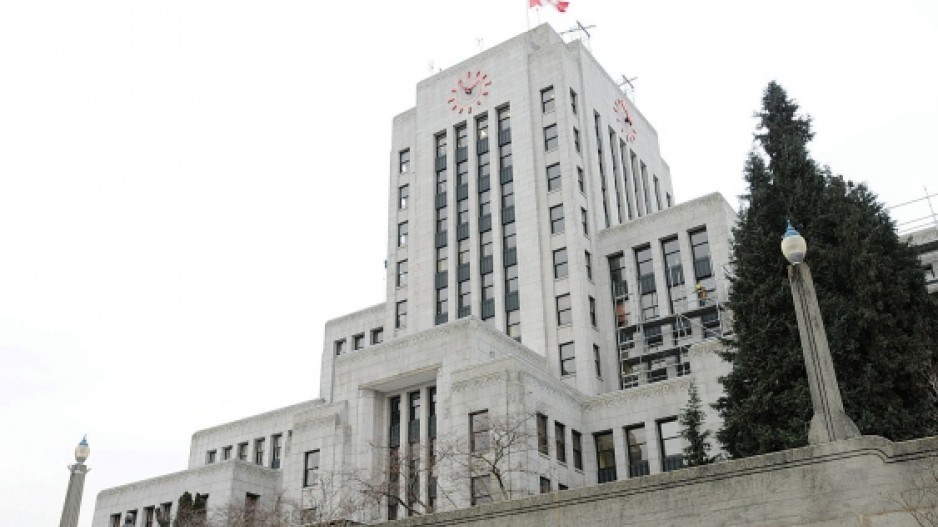British Columbia’s city halls are contracting during the early onset of the COVID-19 pandemic response, and a lengthy economic decline will force local policy makers to decide how to employ financial reserves to stave off much greater attrition.
Paul Mochrie, Vancouver’s deputy city manager, said about 1,500 city workers have been laid off even after factoring in a relatively small number of workers who have been redeployed to emergency operations, particularly in the Downtown Eastside. The cuts are mostly in frontline services, such as at recreational facilities and libraries.
But as the pandemic progresses, those revenue generators will continue to eat away at city budgets, he says.
“The hole depends on the length of time they’re closed. It’s a really broad range of potential outcomes.”
By far the largest revenue stream for cities is property taxes. In Vancouver, property taxes represent $832 million of $1.8 billion in 2019 revenue. Metro Â鶹´«Ã½Ó³»mayors have asked the provincial government to broadly expand property tax deferrals, normally reserved for residential property owners over the age of 55 and with a one-quarter equity stake in the home.
Putting aside that quagmire, Mochrie says council will be given a range of options in the coming month(s) with different pandemic scenarios.
“The full magnitude of the cost impact is still something we’re assessing,” said Mochrie.
He sees it as a given that the city will immediately utilize a $146.3 million stabilization reserve, earmarked for “events such as inclement weather, catastrophic events, environmental hazards, extraordinary public safety situations, economic downturns and unforeseen changes in revenues.”
City manager Sadhu Johnston informed city council Tuesday its revenues are down 90% this month and expects losses in the “hundreds of millions” should physical distancing requirements persist to the end of the year.
But drawing down on the other $1.3 billion in reserves will be a political decision.
“That would be one area for sure that council would ultimately have to decide on; how much of the capital fund gets deferred and those funds redirected back into operations,” said Mochrie
“So there could very well be projects delayed and then the other option would be service reductions - just scaling back the level of services the city provides.”
Â鶹´«Ã½Ó³»has a $1.6 billion operating budget for this year.
But first, the city will need to determine what can and cannot be spent. Many reserves are earmarked under provincial law as “statutory,” meaning they cannot be redirected by city council. And statutory reserves will be needed over the coming year to pay for road repairs and new water mains, for instance - and particularly so if cities need to absorb non-payment of property taxes.
If property tax deferrals are not expanded (paid out by the province to cities as low-interest loans to property owners) and landowners default on payments, a much more substantial hole in the budget will be evident. And cities by law cannot run deficits outside of some loans for infrastructure.
The Ministry of Housing and Municipal Affairs declined to answer whether it will expand property tax deferrals.
Mochrie said there are ongoing discussions between cities and senior governments to determine if there is other financial support coming (mayors have also asked for unconditional grants to cover lost revenue). He said changing legal requirements surrounding statutory reserves isn’t outside the realm of possibilities.
“We’re either going to have to balance or there would have to be some change; either a direct funding infusion or some other change to manage during this time.”
In a worse case scenario and with civic governments left to handle non-payments of taxes, Mochrie envisions a “more drastic response.”
Mochrie notes how each city will vary in its financial response. But few cities have more reserve money than their annual operating budget
Similar to Vancouver, the City of West Â鶹´«Ã½Ó³»has laid off 450 civic workers to date and is now conducting a review of its operating budget.
“We'll be looking for every available cost-cutting measure we can find, moving to only essential services for the next three to six months, and really sticking to the bare necessities,” said Mayor Mary-Ann Booth, via email.
As of December 2018, West Â鶹´«Ã½Ó³»had about $101 million in reserves and $156 million in expenses.
Burnaby has the most total reserves of any B.C. city, with $1.6 billion as of December 2018, thanks to a blitzkrieg of development over the past decade and conservative spending. Its operating budget in 2018 was only $511 million. No one from the city responded to requests for comment on how it may plan to support its residents via reserves.
In Richmond, council has been taxing residents an extra one per cent to bolster its capital reserves for over the last decade. Buoyed by roughly $18 million per year in casino revenues over the last five years, it has accumulated a relatively well-funded capital works reserve for what financial planners have described as being needed for a “rainy day” or economic downturn.
Coun. Linda McPhail said the city has yet to determine how it may cushion the financial blow of the pandemic. McPhail said she would need to give more thought to a long-term response. For now, the city has closed much of the services other cities have. But, when asked how she’d consider cutting spending or simply providing tax rebates or cuts to residents, McPhail suggested city capital works projects would help revitalize the local economy.
Richmond has $540 million in reserves with annual expenses of $439 million (December 2018).
If Burnaby and Richmond are among the better financially positioned cities, Surrey is positioned much less favourably, with only $86 million in reserves and $773 million in annual expenses. Surrey also has $229 million in debt.
Audit committee member Coun. Jack Hundial says city council should reassess its key capital expenditure in the coming two years - a $45 million police force transition from the RCMP to the Surrey Police Department.
- With files from Mike Howell



